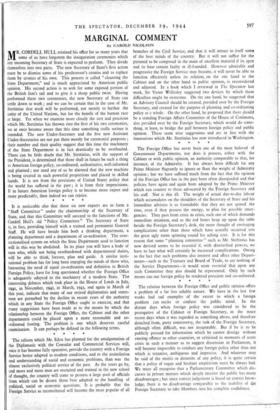The reform which Mr. Eden has planned for the amalgamation
of the Diplomatic with the Consular and Commercial Services will, once it has become fully operative, provide the country with a Foreign Service better adapted to modern conditions, and to the assimilation and understanding of social and economic problems, than was the almost exclusively political service of the past. As the years go by, and more and more men are recruited and trained in the new school of thought, the country will come to possess a large pool of officials from which can be drawn those best adapted to the handling of political, social or economic questions. It is probable that the Foreign Service as reconstituted will become the most popular of all branches of the Civil Service, and that it will attract to itself some of the best minds of the country. But it will, not suffice for the pyramid to be composed in the main of excellent material if its apex and its base remain faulty or ill-founded. However admirable and progressive the Foreign Service may become, it will never be able to function effectively unless its relation, on the one hand to the Cabinet and on the other hand to public opinion, is reconsidered and adjusted. In a book which I reviewed in The Spectator last week, Sir Victor Wellesley suggested two devices by which these difficulties might be overcome. On the one hand, he suggested that an Advisory Council should be created, presided over by the Foreign Secretary, and created for the purpose of planning and co-ordinating policy as a whole. On the other hand, he proposed that there should be a standing Foreign Affairs Committee of the House of Commons, also presided over by the Foreign Secretary, which would do some- thing, at least, to bridge the gulf between foreign policy and public opinion. These seem wise suggestions and are in line with the innovations which Mr. Stettinius has now introduced in Washington.


























 Previous page
Previous page